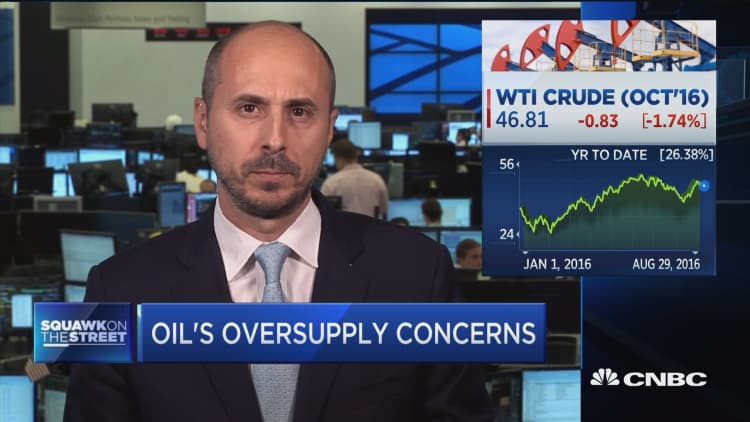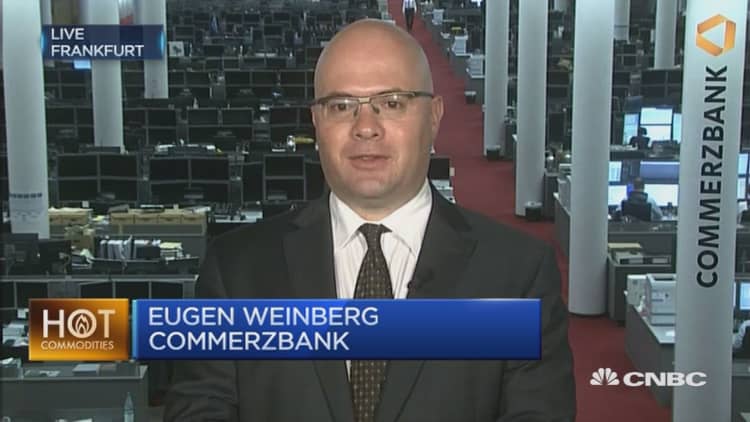Oil prices fell more than 1 percent on Tuesday as the dollar strengthened and investors worried about crude oversupply, bracing for an expected weekly build in U.S. stockpiles.
Warnings of a tropical storm system developing around the oil-and-gas hub in the U.S. Gulf of Mexico limited some of the downside in crude prices, as energy companies announced some production suspensions there.
Oil and gas operators in the U.S. Gulf of Mexico have shut production equal to 168,334 barrels-per-day (bpd) of oil and 190 million cubic feet per day of natural gas as a precaution against a tropical storm, the U.S. Bureau of Safety and Environmental Enforcement said on Monday.
Brent crude futures fell 90 cents, or 1.83 percent, to $48.36 per barrel.
U.S. West Texas Intermediate (WTI) crude was down 63 cents, or 1.34 percent, at $46.35 a barrel.

"Today is just another economic story that's fed the dollar's strength and with the weekly build expected in U.S. crude, prices are getting a double whammy," said Tariq Zahir, a trader in WTI timespreads at Tyche Capital Advisors in New York.
"Yes, we have storm concerns but they are not really affecting production as much as the market bulls would like."
The dollar index, which measures the greenback against a basket of currencies, hit session peaks after the U.S. Consumer Expectations Index rose to October highs.
The dollar has rallied since Friday, after Federal Reserve Chair Janet Yellen raised expectations for a U.S. rate hike in a policy speech. A stronger greenback tends to make dollar-denominated commodities such as oil costlier for holders of other currencies.
Analysts said they expected U.S. crude stockpiles rose 1.3 million barrels last week, the second straight weekly build, as the peak summer period for U.S. driving and gasoline consumption winds down.
Trade group American Petroleum Institute will issue a preliminary inventory report after Tuesday's market settlement at 4:30 p.m. EDT (2030 GMT), ahead of official data on Wednesday from the government.
An Iranian government official said at an oil industry conference in Norway that Tehran's production was expected to hit 4 million barrels per day by year end. Iran was producing that much before Western sanctions brought its oil exports down.
Oil rallied about 20 percent earlier this month, after the Organization of the Petroleum Exporting Countries said it was working with non-OPEC members to reach a production freeze. Iraq said on Tuesday it was committed to freezing output when OPEC meets informally for talks with other producers in Algeria next month.

That contrasted with a recent remark from Iraq's oil minister, who on Saturday said Iraq — which increased crude exports this month from its southern ports — will continue ramping up output.
Saudi Arabian Energy Minister Khalid Al-Falih told Reuters last week he does not believe an intervention in oil markets is necessary since the "market is moving in the right direction".
A Nigerian militant group has said it has ended attacks on the nation's oil and gas industry that have reduced the OPEC member's output by 700,000 barrels a day to 1.56 million bpd.
But the prospect of a recovery in oil production from Libya happening any time soon was tempered after the head of the country's National Oil Corp. said budgetary delays from the new government are undermining oil production.
"Oil prices are caught between concerns about over-supply and a strong dollar on the one hand and the prospect of further jawboning from OPEC members that some form of production freeze could be on the cards," CMC Markets senior analyst Michael Hewson said.
The huge global oil oversupply that has weighed on prices for the past two years may not clear until the second half of 2017, Shell's chief energy adviser Wim Thomas told Reuters.

